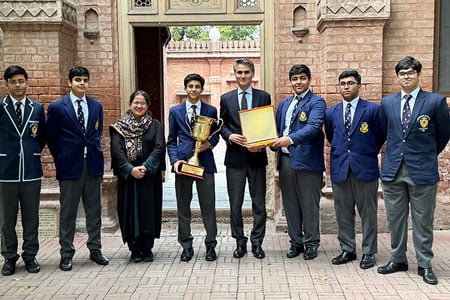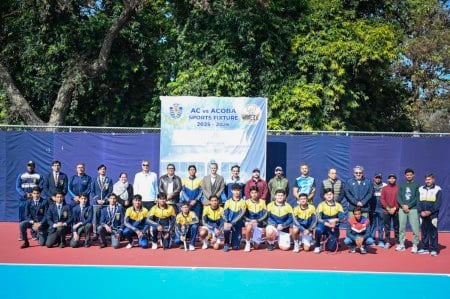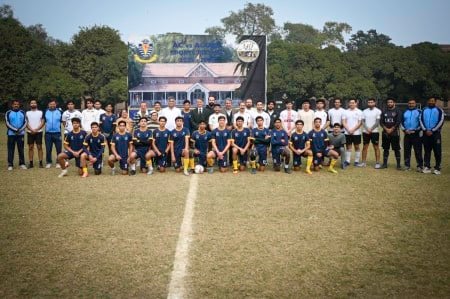Remembrance of Raza Kuli Khan Khattak
By kind favour of Mr. Mueen Afzal (1958)
Raza Kuli Khan Khattak: a distinguished Aitchisonian of the Forties and Fifties.
My dear friend Raza Kuli Khan, as he was known at school, died after a short illness in a Peshawar hospital on the evening of 18th March, 2022. I attended his funeral on the 19th, as did numerous family members, friends and admirers, when he was buried in the family graveyard just outside the old city boundaries. Formal condolences were offered at the family’s house at 10, Fort Road, in the cantonment area. For myself the occasion was both emotional and nostalgic. I had been visiting this grand house since the winter of 1963-64 when it was in fact under construction. The occasion brought back memories from a friendship stretching over 68 years, a friendship which commenced with my joining Aitchison in January, 1954.
It was therefore with charged feelings that I received a request from Michael Thomson, the Principal, to write my memories of Raza’s life and attributes for the school magazine. Raza joined Aitchison in 1947, a traumatic year in the history of our school. For today’s Aitchisonians it is important to understand how delicately poised the survival of Aitchison was at the time of Independence in August, 1947. Aitchison College was the third of six colleges/schools set up as ‘Chiefs Colleges’ in the late 19th century, as the British Indian authorities moved to consolidate their authority over the ‘Crown Jewel’ of the British Empire: undivided India. The motivation for the founding of these schools, later to be called ‘public schools’, on the lines of similar elite schools in the U.K., was to produce ‘God fearing (leaders who) would be a blessing and the custodian of the people’s welfare.’ At the time that Raza joined the school in early 1947, its total strength was 266, with a large majority being from the Sikh and Hindu families of the Punjab. The Partition riots in the summer of 1947 led to the exodus of over 200 students and 26 of the 36 members of the teaching staff from the school. When the school reopened in October, 1947, only 34 students were present in the Morning Assembly, Raza being one of them. By the time Raza left in December, 1956, the total school numbers were around 300, including the Junior School.
Between 1947 and 1956, when Raza Kuli was a student, the school not only survived and grew, but by the mid-1950’s it built up an enviable reputation for grooming students for leadership in politics, military and civil services, the professions as well as in farming and corporate business life. It also further strengthened its old reputation for excellence in sport and character building. This was all primarily due to the efforts of two Principals, G.M.Gwynn who retired in early 1953 and to Z.A.Shah, who took over the principal’s position from Gwynn and continued till the early 1960’s. Both believed in producing an Aitchisonian who embodied the qualities of a scholar, sportsman and gentleman, rolled into one. In his Founders Day speech in March,1952, Gwynn explained his fundamental responsibility as Principal of ‘a school such as this is individual attention and knowledge of the character of the boys entrusted to us.’ In 1953, addressing the Founders Day gathering, Principal Shah defined the duties of an Aitchison schoolmaster as imparting education which trained the body, the mind and which built character ‘to their fullest strength’. Raza Kuli Khan was one of a select products of Aitchison who embodied the unique vision of a quality ‘All Rounder’ in the Gwynn/Z.A. Shah mould. He was hard working, aspiring always for excellence in whatever he engaged in, resolute in standing up for the under-dog, always struggling to distinguish right from wrong and never discriminating in favour of an individual in the light of his or her wealth or position. In my experience he was the least snobby person I ever came across. Although, as the scion of one of the most wealthy and influential families of the NWFP he inherited everything that could legitimately have made him into a snob. What he did inherit were the Pashtun values of equality for all as well as humility, along with a sense of defiance.
While at Aitchison, Raza had a considerable impact on his contemporaries during his years at L.J.House and later at Kelly. In 1952, he shared the Class Prize for M-1 with Abdus Sattar. By 1954, while at Kelly House, he was a member of the School Swimming Team, captained by his life-long friend Aftab Ahmed Khan, who won the Rani of Mandi Challenge Cup that year. He was also in the school Riding Team, for which he wrote the club’s annual report, typically complimenting Risaldar Wazir Ahmed for his ‘hard work and coaching.’ By the time he was in his last year in HSC-2 in 1956, his achievements were considerable: he was a house prefect, and although he narrowly missed winning the Full School blazer, he had adequately established his excellence in riding, swimming, athletics (high jump) and tennis. For The Aitchisonian for 1956 he wrote the annual reports for both riding and swimming, as well as the annual House Report for Kelly House. He contributed a remarkable essay on ‘The Horse’, inter alia pointing out that the origin of the horse went back to pre-historic times when it was a small animal, sixteen inches tall, called Eophipuss. In his essay he predicted that the horse would never be redundant, primarily because it was an essential part of the great game of polo. It was Raza’s lasting love of horses that led to his being a long standing Director on the Board of Brook’s, a British charity for the welfare of horses, which continues to be active in various parts of Pakistan.
After passing his HSC examinations, Raza Kuli went to The Govt. College, Lahore, for his graduation. From there he went on to Oxford University, joining Brasenose College, in October, 1958. At Oxford he obtained his Honours Degree in Philosophy, Political Science and Economics. While at Brasenose, where his uncles Muhammad Aslam Khattak and Yusaf Khattak had preceded him, he was an active member of the college in both academic life as well as sport. The sporting skills which had been honed at Aitchison enabled him to earn a Half Blue for Oxford University in Modern Pentathlon. He would have earned a Half Blue at polo as well but, during his three years at Oxford, the University was unable to raise a full team for the annual match against Cambridge. Later, much to his delight, he discovered that two younger Aitchisonians obtained their Half Blues at polo in 1963 and 1964: Farouq Leghari (1963) and Nawaz Tiwana (1964).
On his return from England, where he had also read for the Bar at Gray’s Inn, he sat for the CSS examination. In 1964, he was offered the Police Service but declined. He then started taking an interest in the family businesses, becoming in short time a Director of Bibojee Services (Pvt) Ltd., a family holding company. Later, he was to be a Director, at various points of time, in about a dozen of the family businesses, as diverse as textiles, automobiles, insurance and tyres. He became a member of the Board of Governors, Aitchison College, and remained there for nearly two decades. His love of polo led to his being a founder and guardian of the Peshawar Polo Club, of which he was President. The French Embassy appointed him as their Honorary Consul in Peshawar, a responsibility that he fulfilled with perseverance and was duly honoured by the President of France with the award of the rank of a Chevalier of France. At the time of his death, he was chairman of the Board of Governors, Langlands School & College, Chitral, and was a very active farmer at his family farm in Haroonabad. When he died in March, 2022, he was survived by his loving wife Shahida Khatoon, his daughter Rukhsana and his son Sikandar, as well his very dear grand- daughter. Among his surviving siblings is Lt. Gen Ali Kuli Khan, who rose to be the Chief of General Staff of the Pakistan army, and like Raza was a high achieving Aitchisonian from Kelly House. By coincidence, Raza’s father was Lt. General Habib Ullah Khan who, like Ali Kuli Khan, was CGS of thePakistan Army, and narrowly missed being head of the army. Lt. General Ali Kuli Khan was in a short list of two for heading the Pakistan army in 1998, losing out in the end to General Musharraf.
I had known Raza ever since 1954, but really came to know him closely when I went up to Oxford in 1960. Raza was among two Aitchisonians up at the time, the other being Ghulam Fariduddin Riaz. He was residing in 1960-61 in elegant rooms at Frewin Hall, a college property, located close to the Oxford Union, off the Cornmarket. It was a challenge at the time, and probably still is, to settle down to studies and life at the University. Raza was like an older brother in helping me to settle into a seamless life at my college, Corpus Christi. He showed the compassionate and fraternal aspects of his personality in gently suggesting how a Pakistani could settle down and benefit from an Oxford education. In particular he demonstrated by example how a balance could be kept between studies, sports, extra-curricular activities and social life at Oxford. In this, he exhibited his debt to his Aitchison education. He impressed me with the versatility of his interests, with his subtle sense of humour as well with his broad- mindedness in dealing with students from different religious, ethnic and financial backgrounds. Above all, it was his integrity of character and plain talk that endeared him to all at Oxford. He was among the founding members of The Malangs, a dining club for Pakistanis at Oxford University. He recalled that he owed his personality and successes at university to what he learnt of morality, in the days of Principal Gwynn, while he was growing up at Leslie Jones House. He lived up to a high moral code which he had, in a sense, constructed for himself on the basis of his Pashtun background and his upbringing at Aitchison College.
I would like to end this memoir with a quote from the speech on Founders Day, of the then Principal, Zulfiqar Ali Shah, while announcing news of the death of former Principal, Mr James Kelly, in Scotland in 1956:
‘Kind and noble persons like Mr Kelly are immortal because their good deeds defy death, remain evergreen and put forth new buds and new blooms, to the delight of those who are fortunate enough to have been befriended by him.’
Mueen Afzal,
Student of Aitchison College: 1954-58.
(Winner of the Churchill House Medal (1958), the Jubilee Medal (1958) and the Godley Medal (1956.)


